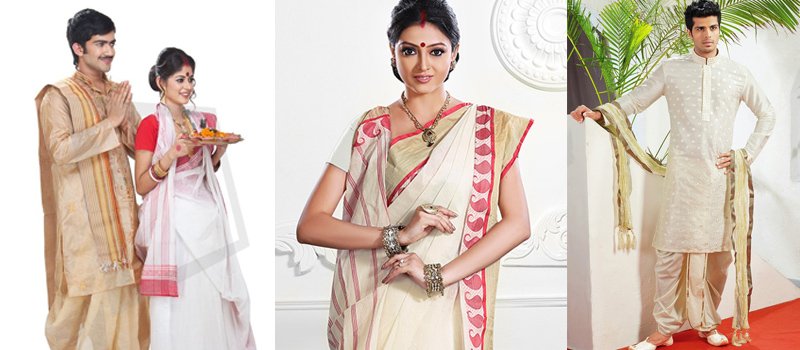West Bengal is a vibrant state renowned for its rich cultural heritage, encompassing its cuisine, music, literature, painting, and stunning traditional attire. Among the state’s cultural treasures is its traditional dress, which plays a crucial role during various celebrations, including the famous Durga Puja. Here is a look at the traditional dress of West Bengal for both men and women.
Traditional Dress of Bengali Women

1. Sarees
Sarees are the quintessential traditional clothing for women in West Bengal. The draping style of sarees in this state is distinct from other regions. Some notable types include:
2. Korial and Garad Sarees
Garad sarees are traditional Bengali sarees known for their white fabric with deep red borders. These sarees hold religious significance and are often worn during Durga Puja, ceremonies, and weddings. They are usually paired with traditional ivory or conch shell bangles, enhancing their elegance.
3. Tant Sarees
Named after the loom on which they are woven, Tant sarees are lightweight and popular in West Bengal. They are perfect for the region’s hot and humid climate, featuring intricate motifs and floral patterns along thick borders.
4. Dhakai Jamdani
Originating from Dhaka, Dhakai Jamdani sarees are celebrated for their intricate designs, including floral patterns woven with silver and gold threads. The time-consuming craftsmanship makes these sarees highly prized and costly.
5. Tussar and Kantha Silks
The Malda district of Bengal is known for its Tussar silk sarees, which have a textured feel and vibrant colors. These sarees often feature traditional and contemporary motifs. Kantha sarees, on the other hand, are known for their running stitches on bright hues and can be both heavy and lightweight with elaborate designs.
6. Muslin Cotton and Murshidabad Silks
Muslin cotton sarees are known for their sheer quality and delicate patterns, offering a simple yet elegant look. Murshidabad silks are high-quality silk sarees with bright colors and traditional batik and block patterns.
7. Baluchari Sarees
Made from fine silk, Baluchari sarees are adorned with golden embroidery and depict Indian mythological characters. Also known as Swarana sarees due to their bright golden borders, the pallu of these sarees is best left unpleated to showcase its detailed design.
8. Kurta and Salwar with Adorable Dupattas
Traditional kurtas and salwars are often paired with colorful dupattas featuring various motifs, embroideries, and exotic patterns. Bengali women frequently complement their kurta-salwar sets with beautiful cotton or silk dupattas in Jamdani or Kantha styles.
Traditional Dress of Men in West Bengal

1. Panjabi Dhoti
Bengali men traditionally wear Panjabi dresses, similar to the kurta and dhoti of northern India. However, Panjabi dresses in West Bengal are typically made from Muga silk, Tussar silk, or cotton silk. Modern adaptations include pairing Panjabi dresses with jeans or trousers, with Garad silk kurtas available in shades like beige, cream, and honey.
2. Kurta Pajama
The kurta pajama is a long-length garment worn with loosely fitting trousers. It is considered regular wear and is usually made from silk or cotton.
3. Lungi (Dhotis)
Similar to South Indian dhotis, Bengalis wear lungis, which are long pieces of white cloth draped around the waist and tucked at the lower back.
Conclusion
The traditional dress of West Bengal vividly reflects the state’s vibrant culture. From the elegant sarees like Dhakai Jamdani to the comfortable Panjabi dhoti, the attire of Bengali men and women is as colorful and diverse as the state itself. This traditional dress remains a vital part of West Bengal’s cultural identity, showcasing the rich heritage and timeless elegance of its people.
















